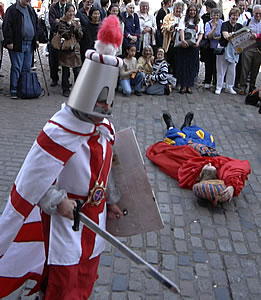
Alphonsus (on-line text) is a play printed in 1599 - but, seeing as it was written by Robert Greene (who died somewhat earlier) it is safe to assume it was in fact printed only after its useful stage life was over and the last drop of profit for the theatre company which owned it, came from the disreputable act of selling the text on.
One date given as a possible performance is 1587 - and by the Queen's Men. This puts it firmly in the realms of Shakespeare acting territory - at least one scholar suggests Shakespeare acted with the Queen's men - and he surely would know the play anyway.
It's not a bad play - its not the sort of play I'd give stage room to myself, but I can see the attraction - it is entertaining: It has all the elements needed for killing an hour or two before bedtime, and the language is quite good.
And straight away I'm into the entertainment at the end of 'A Midsummer Night's Dream'!
I couldn't stop thinking of 'The Dream' as I read - a snippet here, a sound there - and an idea or two.
If you want to know where Bottom gets his idea of declamatory acting from - and such delightful alliteration - read no further than here - Boom Boom Boom!
Amazon fighting and winning love doing injury - well, it's almost here.
And women being meant to flee, not chase - 'were not meant to woo' - almost word for word - almost - here.
But it's not only 'The Dream' - and the words: There's the stage action - there's a good dynamic at times - a flow of action, a movement of scene to scene.
I was reminded of the early History plays - the movement of armies - especially in the second two parts of Henry VI.
Fascinating too was the 'speechifying' - Here I was thrown back all the way to Beowulf, and the Anglo-Saxon penchant for self promotion - half the battle is in a good speech.
Well, tomorrow I'll be delivering two of the greatest - from Henry V - along with a couple of anti-dotes from Richard II - and Mr Greene is going to be haunting the party too.
Technorati Tags: Shakespeare, Robert Greene, Complete Works
One date given as a possible performance is 1587 - and by the Queen's Men. This puts it firmly in the realms of Shakespeare acting territory - at least one scholar suggests Shakespeare acted with the Queen's men - and he surely would know the play anyway.
It's not a bad play - its not the sort of play I'd give stage room to myself, but I can see the attraction - it is entertaining: It has all the elements needed for killing an hour or two before bedtime, and the language is quite good.
And straight away I'm into the entertainment at the end of 'A Midsummer Night's Dream'!
I couldn't stop thinking of 'The Dream' as I read - a snippet here, a sound there - and an idea or two.
If you want to know where Bottom gets his idea of declamatory acting from - and such delightful alliteration - read no further than here - Boom Boom Boom!
Amazon fighting and winning love doing injury - well, it's almost here.
And women being meant to flee, not chase - 'were not meant to woo' - almost word for word - almost - here.
But it's not only 'The Dream' - and the words: There's the stage action - there's a good dynamic at times - a flow of action, a movement of scene to scene.
I was reminded of the early History plays - the movement of armies - especially in the second two parts of Henry VI.
Fascinating too was the 'speechifying' - Here I was thrown back all the way to Beowulf, and the Anglo-Saxon penchant for self promotion - half the battle is in a good speech.
Well, tomorrow I'll be delivering two of the greatest - from Henry V - along with a couple of anti-dotes from Richard II - and Mr Greene is going to be haunting the party too.
Technorati Tags: Shakespeare, Robert Greene, Complete Works







